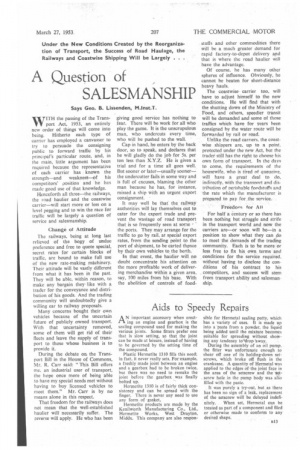A Question of SALESMANSHIP
Page 47

If you've noticed an error in this article please click here to report it so we can fix it.
Says Geo. B. Lissenden, M.Inst.T.
WITH the passing of the Transport Act, 1953, an entirely new order of things will come into being. Hitherto each type of carrier has employed a canvasser to try to persuade the consigning public to forward traffic by his principal's particular route, and, in the main, little argument has been required because the representative of each carrier has known the strength—and weakness—of his competitors' position and he has made good use of that knowledge.
Henceforth all three—the railways, the road haulier and the coastwise carrier—will start more or less on a level pegging and to win the race for traffic will be largely a question of service and salesmanship.
Change of Attitude The railways, being at long last relieved of the bogy of undue preference and free to quote special, secret rates for certain blocks of traffic, are bound to make full use of the new rate-making machinery. Their attitude will be vastly different from what it has been in the past. They will be able, within reason, to make any bargain they like with a trader for the conveyance and distribution of his goods. And the trading community will undoubtedly give a willing ear to railway proposals.
Many concerns bought their own vehicles because of the uncertain future of publicly owned transport. With that uncertainty removed, some of them will get rid of their fleets and leave the supply of transport to those whose business is to provide it.
During the debate on the Transport Bill in the House of Commons, Mr. R. Carr said "This Bill offers me, an industrial user of transport, the hope once more of being able to have my special needs met without having to buy licensed vehicles to meet them." Mr. Carr is by no means alone in this respect.
That freedom for the railways does not mean that the well-established haulier will necessarily suffer. The reverse will apply. He who has been giving good service has nothing to fear. There will be work for all who play the game. It is the unscrupulous man, who undercuts every time, who will be pushed to the wall.
Cap in hand, he enters by the back door, so to speak, and declares that he will gladly do the job for 5s. per ton less than X.Y.Z. He is given a trial and for a time all goes well. But sooner or later—usually sooner— the undercutter fails in some way and is full of excuses, blaming the other man because he has, for instance, missed a ship with an urgent export consignment.
It may well be that the railway authorities will lay themselves out to cater for the export trade and prevent the wastage of road transport that is so frequently seen at some r the ports. They may arrange for the traffic to go by rail, at special export rates, from the sending point to the port of shipment, to be carted thence by their own vehicles to the berth.
In that event, the haulier will no doubt concentrate his attention on the more profitable work of delivering merchandise within a given area, say, 100 miles from his base. With the abolition of controls of food stuffs and other commodities there will be a much greater demand for rapid factory-to-depot delivery and that is where the road haulier will have the advantage.
Of course, he has many other spheres of influence. Obviously, he cannot be beaten for short-distance heavy hauls.
The coastwise carrier too, will have to adjust himself to the new conditions. He will find that with the shutting down of the Ministry of Food, and others, speedier transit will -be demanded and some of those traffics which have for years been consigned by the water route will he forwarded by rail or road.
Unlike the road carriers, the coastwise shippers are, up to a point. protected under the new Act, but the trader still has the right to choose his own form of transport. In the days to come, the requirements of the housewife, who is tired of queueing, will have a great deal to do, indirectly, with the transnort and distribution of perishable foodstuffs and the rate which the manufacturer is prepared to pay for. the service.
Freedom for All For half a century or so there has been nothing but struggle and strife in the transport world and now the carriers are—or soon will be—in a position to show what they can do to meet the demands of the trading community. Each is to be more or less free to fix his own terms and conditions for the service required. without having to disclose the conditions of his coritract to his , competitors, and success will stem from transport ability and salesmanship.




















































































